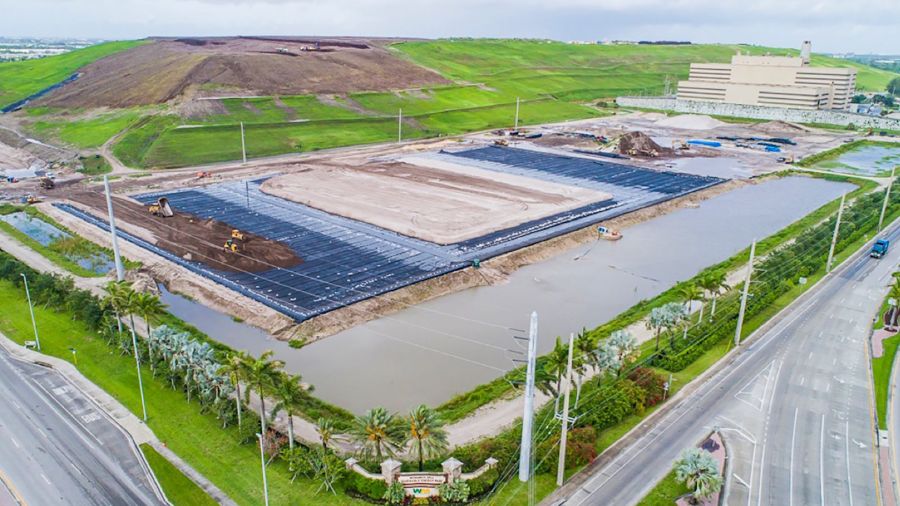
There are 57 Landfills in Florida, serving a population of 20,278,447 people in an area of 53,618 square miles. There is one landfill per 355,762 people, and one Landfill per 940 square miles. The state of Florida is ranked 41st in landfills per capita, and 11th in landfills per square mile. The picture above shows a new landfill getting built near Ft. Lauderdale.
Florida has a MSW (municipal solid waste) recycling goal that includes C&D (construction and demolition) debris. Construction and demolition debris account for almost 25 percent of Florida’s total MSW stream.
The Solid Waste Section is responsible for rule development, solid waste policy, financial assurance compliance, and implementing Florida’s solid waste management program. Technical assistance is provided to the district offices concerning the permitting, compliance and enforcement activities associated with solid waste facilities.
Although Florida has adopted by reference the federal hazardous waste landfill requirements, there are no permitted hazardous landfills in the state, and the construction of new hazardous waste landfills is prohibited. In addition to the federal solid waste landfill requirements, Florida has its own rules for solid (nonhazardous) waste landfills.
In Florida, that’s known as a Type 3 landfill. Floridians generate about 4.2 million tons of this type of trash /garbage in a typical year. Of that amount, 70.5 percent (about 3 million tons) was disposed of in the state’s Type 3 landfills. WasteMap Florida provides citizens of The Sunshine State with an easy-to-use, web-based GIS mapping system to locate solid waste facilities in their local area.
A recent map shows how far the rest of the country will have to come to catch up. There are 2,000 active landfills in the country, and the average American throws out 4.4 pounds of trash a day. Ft Lauderdale rolloff dumpsters can be used to remove junk and garbage from homes and businesses.
Leachate samples will be collected from landfills in the State of Florida and from the effluent of leachate treatment facilities. These samples are to be analyzed with LC-MS/MS for PFAS. Data on leachate volumes and treatment data will be consolidated for landfills in the State of Florida.
Many counties in Florida are well-versed in revenue bond financing and enterprise (or full-cost accounting) funding and, as a result, most of the state’s landfills are publicly owned. No guarantee as to the accuracy of the information in this database is implied or expressed. While additional information may have been submitted to the Department, manpower and resources are not always available to ensure updates of this information to the database are made in a timely manner.
Virtually all household garbage, yard waste, and recycling material is brought to the Walton County Landfill for disposal and/or recycling. Walton County residents may bring their own garbage and dispose of many materials for free. Directions: From U.S. Highway 90 in the City of DeFuniak Springs, head north on State Road 83 for about 3.5 miles.
Hazardous materials are banned from the landfill disposal in the state of Florida, yet are accepted for recycling. At the white goods recycling area, refrigerants are recovered from appliances containing freon, then the white goods are recycled by a scrap metal dealer. Whole tires are also banned from the landfills. They are shredded and chipped and used in industrial facilities.
The Escambia County Waste Services Department owns and operates the Perdido Landfill, an Integrated Municipal Solid Waste Management Facility, in Cantonment. Integrated Solid Waste Management is a series of complementary actions to reduce quantities of solid waste generated and manage that which is generated in an economically beneficial process.
Advanced Disposal facilities throughout Florida provide several services to residential as well as commercial customers in many Florida cities like Fort Lauderdale. These waste services include trash collection, transfer, disposal, and recycling. Find your Florida facility in order to see what waste management services are available in your area.
Waste Management, the nation’s largest waste services provider, operates the Trail Ridge Landfill serving the City of Jacksonville and Duval County area of Northeast Florida. The site is owned by the City of Jacksonville, and Waste Management has a life-of-site operational agreement with the city.
